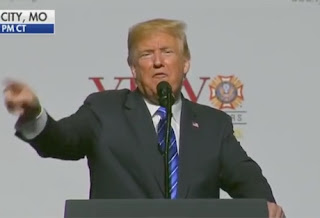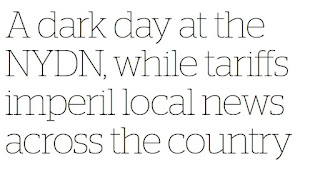Donald Trump to Veterans of Foreign Wars in Kansas City, reported by Philly.com: “Just remember, what you are seeing and what you are reading is not what’s happening. Just stick with us, don’t believe the crap you see from these people [pointing at reporters], the fake news.”
From Time magazine: "For some, the quote immediately recalled a line from Orwell’s dystopian novel 1984: 'The party told you to reject the evidence of your eyes and ears. It was their final, most essential command'.”
Donald Trump @realDonaldTrump on Twitter: "The Summit with Russia was a great success, except with the real enemy of the people, the Fake News Media."
- @Amy_Siskind on Twitter: "This is the 4th time in the last 5 weeks that Trump has called the media the “enemy of the people,” including the week 5 were murdered at the Capital Gazette."
The Guardian Media Group announcing in its annual results that digital revenues have overtaken print for the first time: "Following growth in digital reader revenues and a good competitive performance in digital advertising, digital now accounts for over 50% of GMG’s revenues. Digital revenue growth in 2017-18 exceeded declines in print revenues."
Pete Vernon in the Columbia Journalism Review after it was revealed editorial staff of the New York Daily News is to be cut by half: "If the cuts at the Daily News occur as forecast, New York will wake tomorrow with fewer journalists holding powerful interests to account. As the bite of Trump’s [newsprint] tariffs sinks in, the same story will play out in cities and towns across the country. The causes of this diminishment are manifold, but the absence of reporters from state houses, courtrooms, and school board meetings leaves all of us less informed."
Labour Party deputy leader Tom Watson @tom_watson on Twitter: "A short thread from sources inside Daily Mail: 1/ Paul Dacre is looking to put a consortium together to buy Daily Telegraph and install himself as Editor. 2/ Dacre, so angry at his ousting by Rothermeres, is leaving early at beginning of September and unlikely to take up editor-in-chief position."
Labour Party deputy leader Tom Watson @tom_watson on Twitter: "A short thread from sources inside Daily Mail: 1/ Paul Dacre is looking to put a consortium together to buy Daily Telegraph and install himself as Editor. 2/ Dacre, so angry at his ousting by Rothermeres, is leaving early at beginning of September and unlikely to take up editor-in-chief position."
Roy Greenslade in the Guardian on the Cliff Richard privacy ruling:"Note also the size of the award made to Richard. It is far greater than the previous highest award in a privacy action – the £60,000 granted to Max Mosley in 2008 when the now-defunct News of the World splashed his sexual antics over its front page and ran intimate video footage on its website. Indeed, it is greater than most awards for defamation, implying that privacy has replaced libel as the go-to legal tool to frustrate legitimate media inquiries. Should this judgment be allowed to stand, the likely effect is a chilling of press freedom."
The Financial Times in a leader: "The Financial Times and other media organisations often face pressure from lawyers acting on behalf of wealthy and powerful individuals to stop them being identified in stories about alleged wrongdoing. Privacy law will increasingly be added to libel in the arsenal of legal weapons to cloak misconduct in which the public has a legitimate interest. This ruling is likely to increase the barrage."
Alan Rusbridger in The Observer: "Many journalists will shake their heads at the implications. Does this mean that, in future, it’s OK to report on historical sexual abuse cases – but only if you don’t name the suspect before charging? Does this apply to globalised social media as well? Will readers of British newspapers be kept in the dark about allegations freely discussed online and around the rest of the world? That feels like the wisdom of Canute. But it is also true that, for a generation or more, too many British journalists operated as though privacy was an un-British concept that had to be resisted at all costs."
Jane Martinson in the Guardian: "The 200-plus-page ruling by Mr Justice Mann makes for excruciating reading. No one who has worked in a newsroom will find the examples of swaggering bravado (the reporter talking of putting the police “over a barrel”) or humour (“did he sing Jailhouse Rock?”) surprising. But it gives the impression of a macho culture, where making sure rival news channel ITV did not get wind of the investigation first was key."
Alan Rusbridger in The Observer: "Many journalists will shake their heads at the implications. Does this mean that, in future, it’s OK to report on historical sexual abuse cases – but only if you don’t name the suspect before charging? Does this apply to globalised social media as well? Will readers of British newspapers be kept in the dark about allegations freely discussed online and around the rest of the world? That feels like the wisdom of Canute. But it is also true that, for a generation or more, too many British journalists operated as though privacy was an un-British concept that had to be resisted at all costs."
Jane Martinson in the Guardian: "The 200-plus-page ruling by Mr Justice Mann makes for excruciating reading. No one who has worked in a newsroom will find the examples of swaggering bravado (the reporter talking of putting the police “over a barrel”) or humour (“did he sing Jailhouse Rock?”) surprising. But it gives the impression of a macho culture, where making sure rival news channel ITV did not get wind of the investigation first was key."
Allan McCulloch in a letter to The Times [£]: "Sir, Your editorial “Privacy on trial” (July 19) suggests that the judgment in the Cliff Richard case should not “herald a move towards anonymity and secrecy in the police”. I would suggest that the motivation of the BBC in reporting on the Cliff Richard house search was less to do with monitoring the police and more with “exposing” a celebrity. Perhaps the BBC, in targeting Sir Cliff, was attempting to make amends for its own lamentable failure to “expose” Stuart Hall and another of its employees, Jimmy Savile."
The Sunday Times [£] in a leader on a move to seek lifelong anonymity for a 14-year-old convicted on terrorism charges: "There are arguments on his side. Naming him could expose his family, who were unaware of his part in the plot, to reprisals. It could make the rehabilitation of the troubled teenager more difficult. It could even turn him into a cause célèbre and encourage copycats.
Against this, however, the public has a right to know. It had a right to know about Thomas Wyllie and Alex Bolland, the 15-year-olds named on Friday after being found guilty of plotting a Columbine-style massacre at their Yorkshire school at the age of 14. The judgment against the BBC in the Sir Cliff Richard privacy case will, if unchallenged, give all suspects the right to anonymity until charged. We suffer from too much secrecy, not too little. Anonymity should be used very sparingly."
BBC political editor Laura Kuenssberg, speaking to author Tom Baldwin for his new book Ctrl Alt Delete: How Politics and the Media Crashed our Democracy, as quoted by The Observer: “I’ve tried to pull back and I’ve thought about coming off it all together. Partly, that’s because it’s uglier out there now; it’s like a playground where people want to shout each other down. I don’t read the comments people write about me – it’s not worth it.”
Bradford's Telegraph & Argus on why its switching off comments on its website: "We’re not against robust debate on issues of public interest – far from it. But sadly, an ever-more-vocal minority of our site’s visitors appear to be intent on abusing the ability to comment. They lurk beneath even the most innocuous of stories to grind out personal grudges, rail against the council or the T&A or – worse – pollute the comments section with hate-filled, racist, anti-Semitic or Islamophobic tirades."
[£]=paywallBradford's Telegraph & Argus on why its switching off comments on its website: "We’re not against robust debate on issues of public interest – far from it. But sadly, an ever-more-vocal minority of our site’s visitors appear to be intent on abusing the ability to comment. They lurk beneath even the most innocuous of stories to grind out personal grudges, rail against the council or the T&A or – worse – pollute the comments section with hate-filled, racist, anti-Semitic or Islamophobic tirades."

















No comments:
Post a Comment